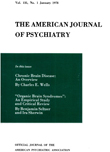Dangerousness, confidentiality, and the duty to warn
Abstract
The Tarasoff decision, by imposing on psychiatrists an obligation to warn the intended victim of threats made by a patient, but only under certain vaguely specified circumstances, may stampede psychiatrists into issuing such warnings to avoid possible legal liability no matter how remote the risk of harm may actually be. The authors suggest that the ill effects of such a reaction by psychiatrists--breach of confidentiality and the attendant erosion of trust and harm to the therapeutic alliance--can often be easily avoided by taking less drastic steps, some of which are illustrated by case presentations.
Access content
To read the fulltext, please use one of the options below to sign in or purchase access.- Personal login
- Institutional Login
- Sign in via OpenAthens
- Register for access
-
Please login/register if you wish to pair your device and check access availability.
Not a subscriber?
PsychiatryOnline subscription options offer access to the DSM-5 library, books, journals, CME, and patient resources. This all-in-one virtual library provides psychiatrists and mental health professionals with key resources for diagnosis, treatment, research, and professional development.
Need more help? PsychiatryOnline Customer Service may be reached by emailing [email protected] or by calling 800-368-5777 (in the U.S.) or 703-907-7322 (outside the U.S.).



